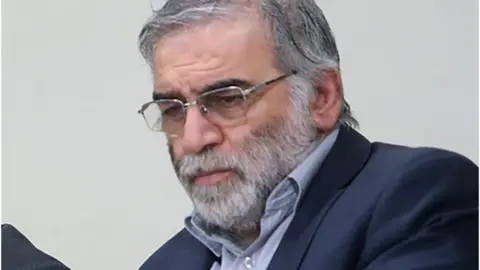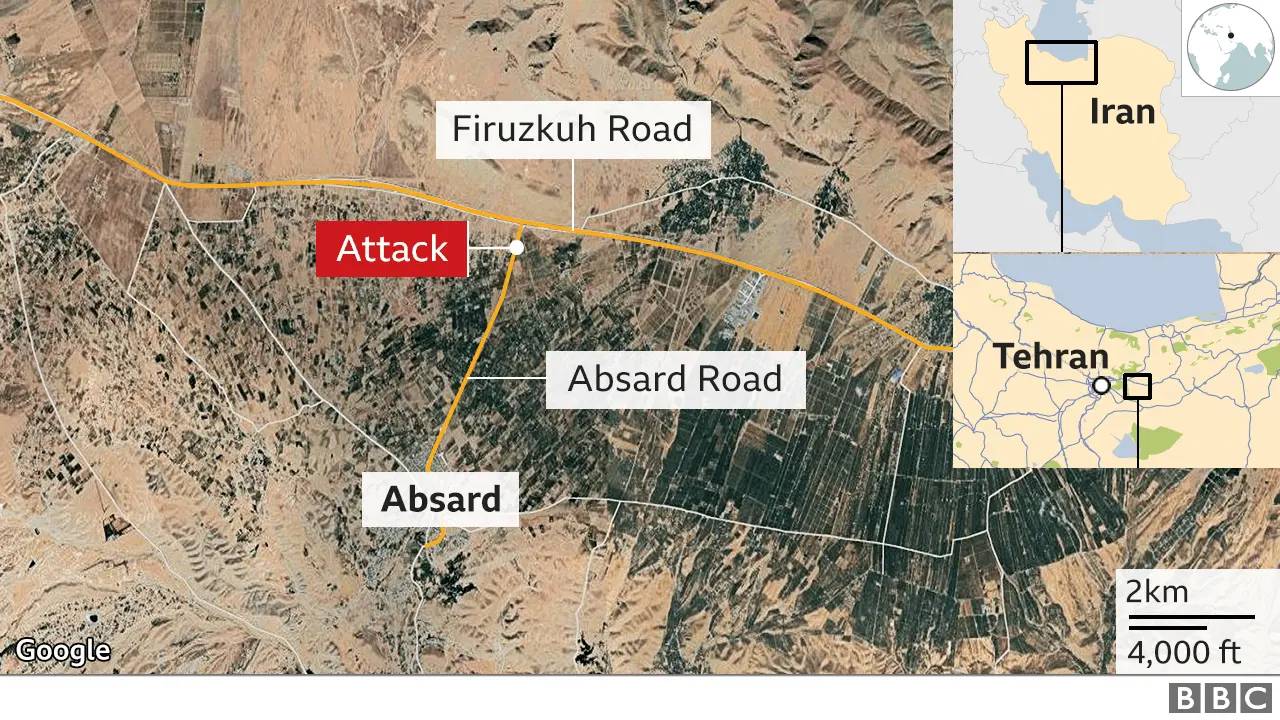Mohsen Fakhrizadeh: Iran blames Israel for killing top scientist
Iran's president has blamed Israel for the killing of a top nuclear scientist on Friday, and said it would not slow down the country's nuclear programme.
Hassan Rouhani also said Iran would retaliate over Mohsen Fakhrizadeh's killing at a time of its choosing.
An Israeli cabinet minister said he had "no clue" who was behind the ambush by gunmen on Mr Fakhrizadeh's car.
Israel has previously accused the physicist of being key to a covert nuclear weapons programme.
Fakhrizadeh was Iran's most renowned nuclear scientist, who headed the ministry of defence's research and innovation organisation.
His killing threatens to escalate tensions over Iran's nuclear programme with the US and its close ally Israel.
How has Iran reacted?
President Rouhani said on Saturday his country would respond "in due course" but that Fakhrizadeh's killing would not push Iran into making hasty decisions.
"Iran's enemies should know that the people of Iran and officials are braver than to leave this criminal act unanswered," he said in a televised cabinet meeting.
"In due time, they will answer for this crime," he added.
 Reuters
ReutersIn an earlier statement, the president accused the "the mercenaries of the oppressive Zionist regime" - referring to Israel - of being behind the attack.
"The assassination of martyr Fakhrizadeh shows our enemies' despair and the depth of their hatred... His martyrdom will not slow down our achievements."
Iran Supreme Leader Ayatollah Ali Khamenei also called for the "punishing" of the perpetrators of the attack "and those who commanded it", in a tweet on Saturday.
His military adviser, Hossein Dehghan, had earlier vowed to "strike" the attackers like thunder.
The New York Times quotes three US officials, including two intelligence officials, as saying Israel was behind the attack. But Israeli cabinet minister Tzachi Hanegbi said on Saturday that he had "no clue" who was behind the killing.
Fakhrizadeh's name was specifically mentioned in Israeli PM Benjamin Netanyahu's presentation about Iran's nuclear programme in April 2018.
Israeli embassies around the world have been placed on high alert, according to Israel's N12 news website on Saturday.
Foreign Minister Mohammad Javad Zarif called on the international community to "condemn this act of state terror".
What's the context?
News of the killing comes amid fresh concern about the increased amount of enriched uranium that Iran is producing. Enriched uranium is a vital component for both civil nuclear power generation and military nuclear weapons.
A 2015 deal with six world powers had placed limits on Iran's production of enriched uranium, but since US President Donald Trump abandoned the deal in 2018, Iran has been deliberately reneging on its agreements. However, it insists its nuclear programme is exclusively for peaceful purposes.
Joe Biden has pledged to re-engage with Iran when he becomes US president in January, despite long-standing opposition from Israel.
The former head of the US Central Intelligence Agency (CIA), John Brennan, said the killing of the scientist was a "criminal" and "highly reckless" act that risks inflaming conflict in the region.
In a series of tweets, he said Fakhrizadeh's death "risks lethal retaliation and a new round of regional conflict".
Mr Brennan added that he did not know "whether a foreign government authorised or carried out the murder of Fakhrizadeh".
UN Secretary-General António Guterres has urged restraint, while on Saturday a spokesman for Germany's foreign office called on all sides "to refrain from any steps that could lead to a further escalation of the situation".
"A few weeks before the new US administration takes office, it is important to preserve the scope for talks with Iran so that the dispute over Iran's nuclear programme can be resolved through negotiations," a statement said.


These are weeks which matter - the countdown to 20 January when President-elect Biden takes office with a new approach to Iran, including an expected return to the 2015 nuclear deal.
This assassination follows the not-so-secret meeting last week in Saudi Arabia between the Saudi crown prince and Israeli prime minister - officially denied by the kingdom. It sent another signal that Mohammed bin Salman and Benjamin Netanyahu see this window as their last best chance in a while to try to inflict a crippling blow on their arch-enemy Iran - a blow to also complicate an already challenging course for a new US team to re-engage with the Islamic Republic.
All sides know it's also a moment fraught with risk. Iran's President Rouhani declares Iran is "too wise to fall into Israel's trap".
An immediate retaliation risks an even greater reply, and a descent into even greater crisis which could imperil any chance of a new start in January.

What happened to the scientist and why was he important?
Iran's defence ministry said the leading scientist was seriously wounded after attackers targeted his car and exchanged fire with his bodyguards, in the town of Absard, to the east of Tehran, on Friday.
Fakhrizadeh later died from his injuries in hospital.

It is not clear what happened to the perpetrators of the attack.
Fakhrizadeh has long been spoken about by Western security sources as extremely powerful and instrumental in Iran's nuclear programme.
According to secret documents obtained by Israel in 2018, he led a programme to create nuclear weapons.
At the time, Israeli Prime Minister Benjamin Netanyahu said he identified Fakhrizadeh as the head scientist in the programme, and urged people to "remember that name".
In 2015, the New York Times compared him to J Robert Oppenheimer, the physicist who directed the Manhattan Project that during World War Two produced the first atomic weapons.
A professor of physics, Fakhrizadeh is said to have led Project Amad, the alleged covert programme that was established in 1989 to research the potential for building a nuclear bomb.
It was shut down in 2003, according to the International Atomic Energy Agency (IAEA), though Mr Netanyahu said the documents retrieved in 2018 showed Fakhrizadeh led a programme which secretly continued Project Amad's work.
The IAEA (the United Nations' nuclear watchdog) has long wanted to speak to him as part of its investigations into Iran's nuclear programme.
Suspicions that Iran was using the programme as a cover to develop a nuclear bomb prompted the EU, US and UN to impose crippling sanctions in 2010.
Since President Trump abandoned the 2015 deal, tensions between the US and Iran have escalated, peaking in January with America's assassination of Gen Qasem Soleimani, commander of the Iranian Revolutionary Guards' Quds force.
